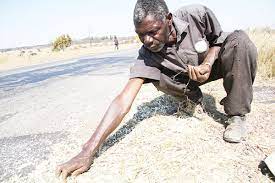An elderly man picking grain on the road side
Permanent Secretary in the Ministry of Information, Publicity and Broadcasting Services, Nick Mangwana says the current crop of farmers in the country have reached the stage that former farmers were, ‘when Zimbabwe was the breadbasket of the region.’
Apparently, Zimbabwe, formerly Rhodesia, was known as the breadbasket of Africa until 2000, after the chaotic land reform programme.
Before that time, the country was exporting wheat, tobacco, and corn to the wider world, especially to other African nations.
Meanwhile, today Zimbabwe is a net importer of foodstuffs from other countries, key among them, South Africa, Zambia, Botswana, along others.
However, Mangwana thinks otherwise, he believes the country is now back to old glory, when it was net exporter of agricultural produce.
“lot of abuse has been lobbed at Land Reform Program beneficiaries, but the program has empowered a lot of households.
“Our people are now at the level where the former farmers were at but this time it’s many people,” he says.
According to relifweb in a recent report, despite the constitutional protection of the right to food and a sophisticated set of human-rights based national laws and policies, man-made starvation is slowly making its way in Zimbabwe, quoting a the UN expert of the right to food after visiting the country from 18 to 28 November 2019.
“More than 60% of the population of a country once seen as the breadbasket of Africa is now considered food-insecure, with most households unable to obtain enough food to meet basic needs due to hyperinflation,” said Hilal Elver, Special Rapporteur on the right to food, presenting a preliminary statement at the end of an 11-day visit.
“In rural areas, a staggering 5.5 million people are currently facing food insecurity, as poor rains and erratic weather patterns are impacting harvests and livelihoods.
“In urban areas, an estimated 2.2 million people are food-insecure and lack access to minimum public services, including health and safe water.
“These are shocking figures and the crisis continues to worsen due to poverty and high unemployment, widespread corruption, severe price instabilities, lack of purchasing power, poor agricultural productivity, natural disasters, recurrent droughts and unilateral economic sanctions,” noted the official.
-Zwnews













